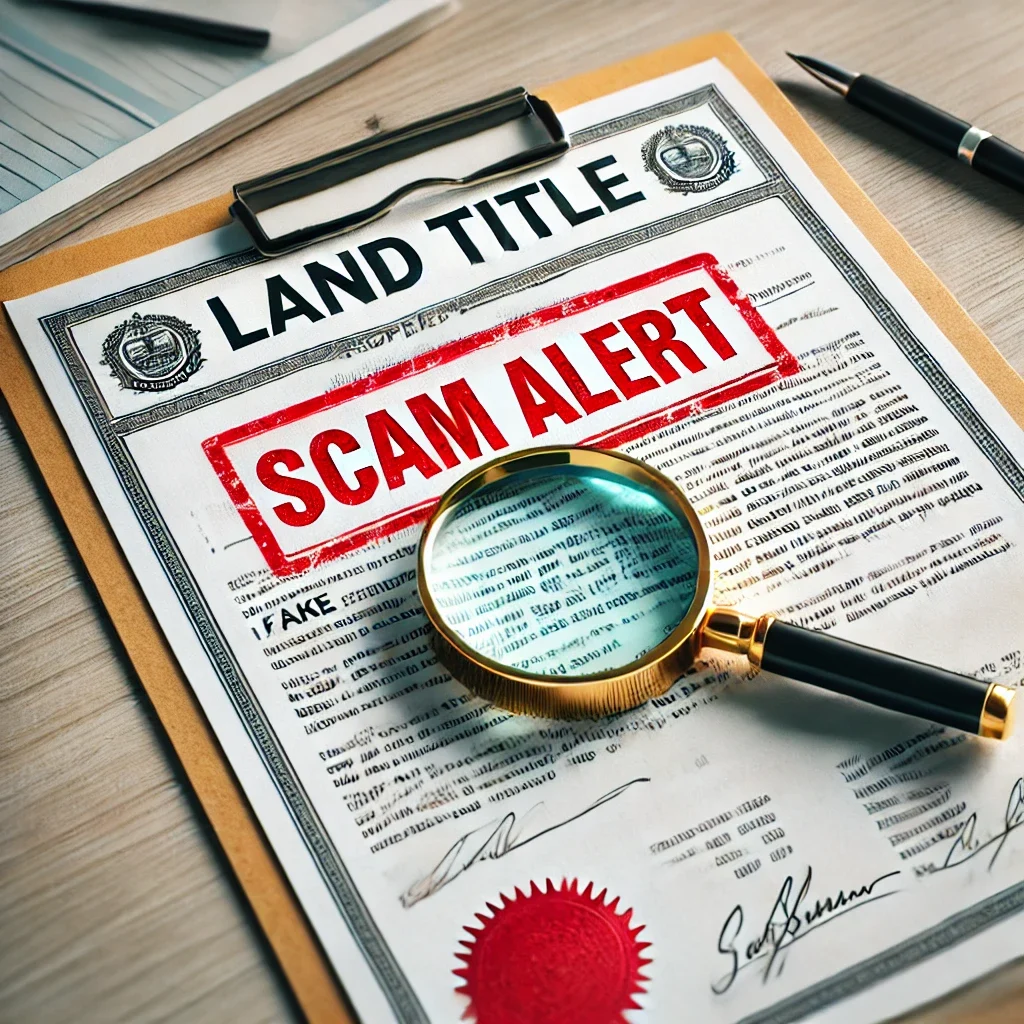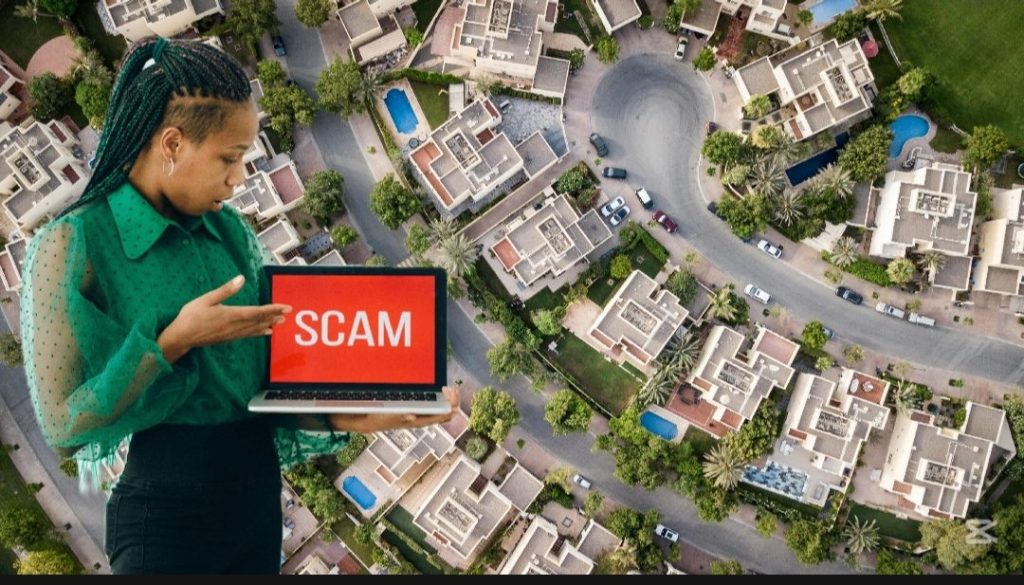Real estate scams are on the rise, and if you’re not careful, you could lose millions to a fraudulent property seller. At Encumbered Properties, we bring to you details and information of disputed/ encumbered properties and properties that are for any reason(s) are not for sale; we also teach on the common tricks of land grabbers and scammers, thus helping you make safe and profitable real estate investments.
Below are 10 checklists that indicate a property seller or real estate agent might be fraudulent. If you notice any of these, walk away immediately so as to avoid dealing with a fake real estate agent, and also avoid common real estate frauds.
1. Refusal to Provide a Title Deed By Property Seller
A title deed is the legal proof of ownership, and without it, you cannot verify who owns the property . A fraudulent property seller, can try to pass off survey plans as ownership documents, don’t fall for it! A survey plan is NOT proof of ownership. If the seller can’t provide a title deed, don’t proceed.
What You Should Do:
- Always demand a valid Title deed (Certificate of Occupancy (C of O), Right of Occupancy (R of O); Deed of Assignment, or Power of Attorney).
- Verify the title at the local land registry and at EncumberedProperties.Com before making payments.
2. Property Seller’s Name Doesn’t Match the Title Deed
If the seller’s name differs from the one on the title deed, it’s a red flag. A fraudulent property seller can come up with title deeds with mismatching credentials. Ask for a Power of Attorney and verify its authenticity by meeting the original owner.
What You Should Do:
- Request official documents proving authorization.
- Meet with the original property owner for confirmation.

3. Inability to Verify Property Title at the Local Land Registry
All legitimate properties should have records at the local land registry. If the seller claims the property is backed by customary or traditional ownership, conduct extensive background checks. It may have legal disputes or be family-owned land with multiple claimants. This might be a sign that you are dealing with a fraudulent property seller.
What You Should Do:
- Search the land registry database before purchasing. Click here to check Abuja land registry
- Check EncumberedProperties.com to see if the property is flagged as disputed, encumbered, or not for sale. (Click here to check Property Status Now at encumberedproperties.com)
4. The Property Seller Has a Shady Background
Before buying from any seller, conduct background checks on the person you are dealing with. If he’s a person that has no integrity, what guarantee do you have that the person will be honest with you? Always run background check on anybody that you are about dealing with, to avoid falling in the trap of fraudulent property sellers. There are so many ways to run background checks: you can get some information about a real estate company, firm or agents. You can get some information about them online, you can get their reviews from their listings, from their local jurisdiction where they operate, from their fellow realtors, from their fellow agents, from the community where the seller resides, these are environments where you can ask one or two questions about the integrity of the person you are about dealing with.
What You Should Do:
- Search online reviews and ask local realtors about the seller’s reputation.
- Ask local agents and community members about the seller
5. Property Seller Doesn’t Have Access to the Property
If a seller cannot take you to the property, they probably don’t own it. If the seller cannot access the property he is marketing to you, that is a red flag. It doesn’t ordinarily make sense, someone claims to be the owner of the property or that has authority to sell a property but at the same, time he can’t be able to access the property. I advice you walk away!
What You Should Do:
- Visit the property in person before making any payments.
- Ensure the seller has physical access to the land or building.
6. Property Seller Requests for Untraceable Payments Methods
Fraudulent sellers prefer cash payments or crypto currency transactions because they are hard to trace. Anytime a seller is pushing for cash payments, you have to tread with caution and review whether you have actually done enough background check on the property and the person you are dealing with.
What You Should Do:
- Always use bank transfers for proof of payment
- Avoid physical cash payments above ₦5 million, as it violates Nigeria’s Money Laundering Act


7. Refusal Of Escrow Services By Seller
Escrow services protect buyers by holding funds until legal conditions are met. Escrow services are services that are contingent upon fulfillment of one condition or the other. An escrow account can be opened and the amount for the property with the caveat or instruction to the bank that this seller cannot withdraw until I confirm to you that the transaction in question is completed or the money can be deposited in the account of a third party. If a seller refuses to use this service, it’s likely they want to take your money and disappear.
What You Should Do:
- Use a trusted third-party escrow service.
- Only proceed if the seller agrees to an escrow service
8. Property Seller Creates a Fake Sense of Urgency
Scammers pressure buyers into rushed decisions, claiming multiple buyers are interested. If the seller is pressurizing you, if the seller pushes for quick decision on your part, or creates any fake sense of urgency, giving you the impression that the property is a gold mine, that it has lots of buyers vying for it, that you should purchase immediately or you might lose it to another bidder who is unanimous to you, please run away!
What You Should Do:
- Take your time, verify all documents before committing dine!
- If a seller is pushing too hard, walk away.
9. Property Seller Refuses To Meet with Your Lawyer
Fraudsters avoid third parties, especially legal experts (lawyers or legal advisors ) who can detect their scams. If the seller refuses to meet with your attorney, don’t proceed with the transaction.
What You Should Do:
- If the seller refuses a meeting where a third party, especially your lawyer will be present, walk away!

10.Property Seller Interferes With Due Diligence
A genuine seller should allow you to independently verify the property. If they insist on being present during verification, they might be trying to control the narrative and hide the truth.
What You Should Do
- Conduct research without the seller being present
- Verify property history at the land registry without the presence of the seller
- Log into encumberedproperties.com to verify if someone had flagged the property as “Not for Sale” or “Disputed” or “Encumbered”
Conclusion:
Secure Your Real Estate Investment & Avoid Scams. Investing in real estate can be highly profitable, but only if you avoid fraudulent sellers. By following these 10 red flags, you can protect yourself from scammers, fraudulent property sellers, and disputed properties.
Thinking of investing in real estate in Nigeria but have questions? Checkout Our Frequently Asked Questions (FAQ) Guide. To get expert answers to the most common real estate concerns!
Read the Full FAQ Guide Here by clicking on this link.
At Encumbered Properties, our mission is to help you make safe and informed property investments decisions. Before you buy, always:
Verify the title deed at the local land registry;
Check the property status on EncumberedProperties.com;
Consult a real estate lawyer; and
Avoid untraceable cash transactions.
Watch the complete video of this article being extensively explained for better understanding by clicking on the video below, or visit our YouTube channel through the link below in this article to watch the educative video and many more informative piece to keep you scam free on real estate investing.
While you watch out for our next article, follow us on:
Facebook: Encumbered Properties Limited
YouTube: @encumberedproperties
Instagram: @encumberedproperties
Want to learn more? Drop your questions in the comments below, and let’s discuss how to make real estate investments safe and profitable!
This article was put together by Madueke Enwere: a property lawyer, a real estate investor, a senior police officer and by God’s grace, the founder, encumberedproperties.com


[…] click here for the guide on avoiding real estate scams […]
[…] Click here to read now […]
Learn how to spot red flags in Real Estate investing to avoid being scammed
[…] Click here to read now: […]